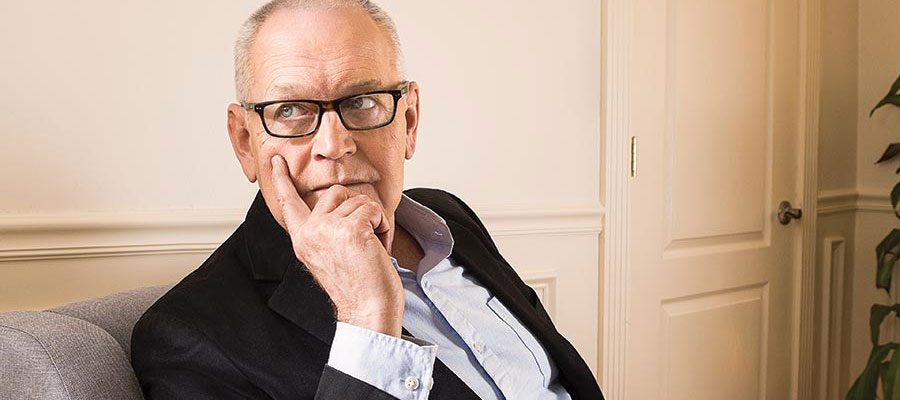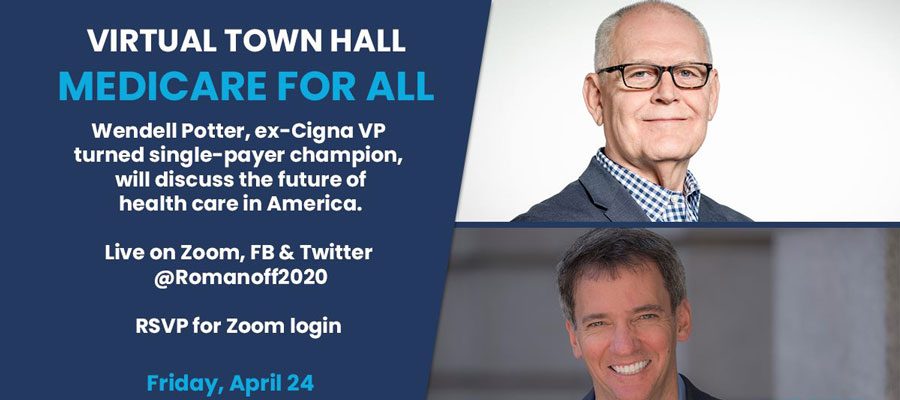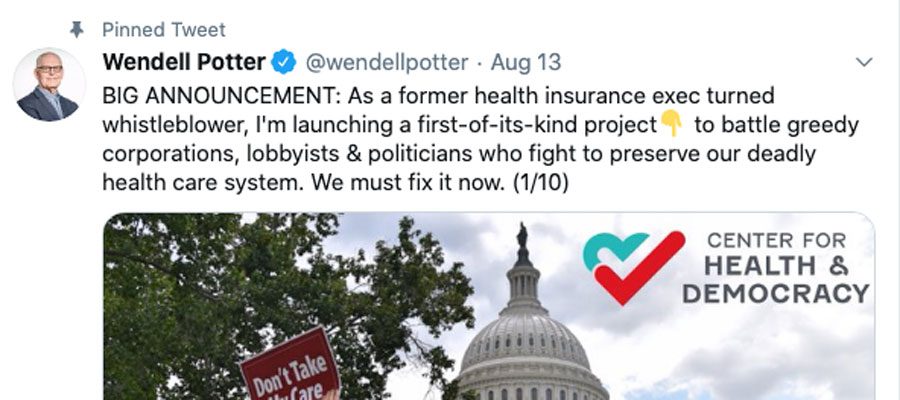Functional medicine is growing by leaps and bounds, but you wouldn’t know that by looking at most health insurance plans.
According to Grand View Research, the market for “complementary and alternative medicine” is expected to grow to $296.3 billion globally by 2027. This is a remarkable milestone considering how little attention holistic approaches to medicine get from health insurers.
So, why do so many insurance companies refuse to cover functional medicine?
This seemed like the perfect topic to discuss with Wendell Potter, a best-selling author and former high-ranking health insurance executive who abruptly quit his job and became the industry’s most outspoken critic. Since then, he has written two books that turn the spotlight on the greed and corruption in health insurance corporations, and he also leads several non-profit organizations fighting for change.
I had the pleasure of interviewing Wendell on Changing Healthcare, and you can read the discussion below. It has been slightly edited for length and readability.
See our interview with Wendell Potter on Changing Healthcare:
Patrick: Thanks for speaking with us, Wendell. You have an amazing story. Can you tell us a little bit about your journey from the VP of Corporate Communications for Cigna to becoming one of the most vocal critics of the health insurance industry?
Wendell: Well yes, I spent twenty years in the industry, first with Humana and then with Cigna. I left after a crisis of conscience that began to develop several months before I left, and largely as a consequence of a trip back to Tennessee where I grew up. I have lived in Philadelphia for quite a long time, but I grew up in East Tennessee, a very poor, fairly remote part of the country.
I flew back to visit family, and while I was there I read in the newspaper about something called a Health Care Expedition. It was being held pretty close by at a county fairgrounds, and the story said that people were likely to drive from hundreds of miles away. In many cases, they would sleep in their cars overnight just to get a chance to get inside the fairground gates to get the care they needed. The demand was that great, and [the organizers] could only accommodate so many people in a given day. This is over three-day long weekend.
I was curious, so I drove up there and saw something I just could not imagine was possible in the United States. I saw people lined up. The lines stretched completely out of sight, and in many cases they were soaking wet because of the rain just before I got there. I noticed a lot of those lines led to barns and animal stalls. I was just absolutely stunned.

I had been able to lead a pretty comfortable life as a corporate executive. I was not even aware of [the organization putting on the event], even though it is an annual event that had been going on for nine years. I knew immediately when I saw that I had to take some responsibility for it, because my job was, in many regards, to perpetuate our current healthcare system and reward shareholders, because the companies I work for for-profit health insurance companies.
I also knew that if I had not been lucky, I could have been one of those people, like a lot of the folks that I grew up with. I was the first person in my family to go to college, and I realized that some of those people in those lines could have been people I grew up with, could have been neighbors, could have been relatives.
It was a true awakening, an epiphany for me. I also had been a reporter in my first career and I realized on the spot that what I was doing for a living was in many ways the exact opposite of what I used to do as a reporter. I never knowingly misled people [as a reporter] or wrote anything that was not accurate to the best of my knowledge.
I had to accept the truth that – in my career in the insurance business – that was exactly what I was being paid to do. To mislead people in many cases. To often tell half-truths, which in many cases can be even more damaging than an outright lie.
So I decided I would have to figure out some other way to earn a living. I could not get that out of my head, and I ultimately walked away.
“I worked with my counterparts…to create — we call them Strategic Communications Plans — but they were really campaigns based on fear, uncertainty and doubt to get people to be afraid of change we all need.” – Wendell Potter, Whistleblower & Health Insurance Reform Advocate
Patrick: That is so remarkable. It is such a part of our national conscience what a mess our healthcare system is right now. There have got to be other people in the industry that feel like you do. Is it just that they are so insulated? Is it just that they have not taken the time to witness events like the one you went to and expose themselves to the truth?
Wendell: It takes something like that to prompt someone to really do a self-assessment.
It does not happen to a lot of people, apparently. You are right. There are a lot of people in the insurance industry who also know it is not a good system. On the other hand, the job I had gave me some insights into how my company and the industry really works in ways most people — even within these companies — do not get a chance to see. They do not do the kind of work that I was doing.
I had a job that was near the top of the company that gave me insights into what really motivates top executives, and I also worked with my counterparts in other companies with our Trade Association to create — we call them Strategic Communications Plans — but they were really campaigns based on fear, uncertainty and doubt to get people to be afraid of change we all need.
{{cta(‘f966b4ab-1e1d-498c-8503-2122033da397’)}}

What Are Health Insurers Saying About Functional Medicine?
Patrick: Yes, and that confirms what so many people really suspect about what goes on there. What makes your perspective so incredibly powerful is that you have been on the inside of this, and you really know how the system works and how it sustains this situation where people are just paying out the nose for health insurance and getting very little affordable care in return for it.
This is a good segue into the fact that there is very limited coverage out there for so-called “alternative care” services, like functional medicine, acupuncture, chiropractic care. In fact, in many small to medium-sized businesses, in the plans they offer don’t include them at all, right? But in the meantime, demand for functional medicine services has gone up and up. So, as somebody who has been on the inside, can you share what health insurers are discussing internally when it comes to natural medicine?
Wendell: Well, it is not something that is discussed as much as it should be. It often takes years before something becomes a covered benefit.
I remember when I first joined the insurance business, began working, I do not think even chiropractic care was covered under many, if any, benefit plans that my company offered. So it takes time.
To be honest with you, there is a lot more conversation about how can you meet shareholders’ profit expectations. How can you avoid paying claims? How can you manage medical expenses in ways that maximizes profits? Those are the kinds of conversations that really go on.
I do not recall ever being in a meeting during at least the last ten years of my career in which there was a real conversation of any kind about what is in the best interest of the health plan members. It is all about what is in the best interest of the shareholders. In all cases, the top executives are also shareholders. So they have a financial, vested interest in maximizing profits, because the more the company is able to make profits, the more they benefit as well. So, there is just not much conversation about [natural medicine]. Period.
Patrick: People on the outside tend to think of [health insurance] in almost the same way as auto insurance, right? You are trying to minimize risk. You are paying into a system and getting rewards for it. But really, people assume health insurers are providing the best care possible, even if it is expensive. They may not understand the real conversation happening there is about how to maximize profitability to shareholders, but I suppose maybe I am just naive.
Wendell: Well the problem is that health insurance companies have increasingly become for-profit corporations and it was not like that when I was growing up.
All of them used to operate on a non-profit basis. It is only within the last several decades that that most of them have become for-profit businesses with this slavish devotion to the shareholder. So that is something that has worked against the best interests of the rest of us. Again, I think maybe back in the day, insurance companies that were non-profit, they were not actually getting between a doctor and his or her patients or patient or clinician or practitioner, but that has changed. All too often, the way to maximize profits is to erect barriers to care.

Patrick: I have always looked at this issue and thought with conventional medicine on the one hand, it is sort of widely accepted that they are focused on managing diseases.
Wendell: Exactly.
Patrick: Prescribing pharmaceuticals, addressing acute problems, whereas functional medicine is much more about attacking the root cause, which is usually related to a hormonal imbalance or the gut, or something that creates a domino effect within their metabolic systems. You’d think that as more data is accumulated that health insurers would be eager to embrace an approach to medicine that has long-term benefits, but that just does not seem to be the case here.
Wendell: It is not the case. Someone has said, it was not me, but someone said we do not really have a health care system in this country. We have a disease management industry, and from the perspective of a lot of health care providers, certainly most pharmaceutical companies, they are not all that keen on getting you well.
They would love for you to be on maintenance medications for the rest of your life. That is how they make money.
There is very little research into anything that is an alternative to that kind of profit-making. You have other things that are a factor as well too.
To be honest with you, insurance companies are not that interested in saving money. They do not want to pay claims, but they do not necessarily care all that much that health care costs continue to go up, and they do not care that much either about devoting a lot of resources or time and attention to getting people healthy, keeping them from getting sick in the first place. Because there is a lot of churn in the insurance business. You might be Aetena member today and a Cigna member next month. So, there is a lot of churn and insurance companies do not think it is in their financial interests to devote a lot of time and resources on individual health plan members.
“We do not really have a health care system in this country. We have a disease management industry, and from the perspective of a lot of health care providers…they are not all that keen on getting you well. They would love for you to be on maintenance medications for the rest of your life.“
Lack of Research Supporting Functional Medicine Effectiveness
Patrick: I have done some other research on this topic and there is a great article Envita published on why functional medicine is not covered by insurance, and they point to several barriers that exist in the broader picture here.
One of the things they mentioned is that health insurers point to the lack of research they use to determine the necessity of “alternative care” and how it would apply with conventional models, so they can determine how they would manage costs, and so on. But at the same time, they are also kind of writing the rules themselves about what is permissible and what is not. Do you have any thoughts on that?
Wendell: Well, it is true. They do. You have heard the term “evidence-based medicine.” That is a term that has gotten a lot of circulation within the industry for many, many years.
They are not keen on covering anything that is not based on research published in some peer-reviewed journal. The other thing too, though, is that insurers frankly more often than not follow the lead of the Medicare. There is usually a pretty short time frame if Medicare begins to cover something, insurance companies pretty soon will also. Then, of course for medications and things like that, they will say that it is important for them to protect their members from any adverse events, and so they look to FDA approval before covering anything. They often will say something is not FDA approved so we are not going to cover it.
Related Content: What Is a Good Healthcare Marketing Plan During the Pandemic?
Health Insurance Coverage Varies From State to State
Patrick: Yes, that is a whole other can of worms pertaining to supplement companies and the claims their products can make. It just seems like there is a real quagmire in terms of getting more people access to this approach to medicine that people are increasingly embracing.
What gave me faith in [functional medicine] early on was that it is not necessarily about taking more pills, even though vitamins are part of it. It is about participating in your overall health, in being more active and making lifestyle changes that really impact your goals.
It just seems like a much more commonsense approach to care, and there are some insurers out there that are dabbling in this. Here where I live, some natural medicine services are covered but in other states, it is a non-starter. Based on what you have told me already, why is it that some companies are sticking their toe in the water whereas others are completely hands-off?
Wendell: Part of the problem is because we do have so many different companies, and they all have their very different practices, rules, and regulations. They have their own list of what they will cover, and it varies.
Even [when patients are seeking] an approved product or service, it does not necessarily mean that you are going to get it, because the barriers insurance companies have erected includes something called prior authorization.
You can have something that is a covered benefit, but if a medical director of an insurance company says “Nah, I do not think that is in the best interest of that patient,” they can deny that service. They have got enormous power.
So you have that going on as well too. These are very subjective decisions, and some companies will be more lenient or embrace things that others will not.
Also, there are thousands of permutations of health clients. Most of us in this country get coverage if we have private insurance through an employer. For large employers that offer coverage, they actually are the insurer. Often the decision is made by an employer that contracts with an insurance company to manage benefits.
So there are wide variations across the country and in insurance plans. Where you live is another factor. If you are living in a state like Vermont there is a probably a greater chance that health plans might cover things than say plans in Tennessee.

Legislators can also play a role. Insurance companies hate state mandates, but they come up all the time. Lawmakers in a given state can require insurance companies that operate in that state to cover certain things, and that obviously varies from state to state. There is no consistency. So, it is just a real patchwork and the problem with that is that you have no control over it. We are pretty powerless in terms of influencing a health plan or an employer. Not completely powerless. That is something we can talk about.
Patrick: Right. So do you believe the real core of the issue is just that health insurers have not figured out a way to make a lot of money from the industry? All these studies and pharmaceutical companies can obviously afford the astronomical cost of this research in order to just get a seat at the table. Whereas that is unlikely to ever happen in an industry [like functional medicine] that is mainly financed through small practitioners.
Wendell: That is true in the insurance business. It is in the business to make money, and I have often said one thing they know how to do is make money.
I cannot tell how many times during my career when I would hear about something being proposed that was new. Someone would say, “What is the business case for that? Has someone done a business case?” What that truly means is has anyone worked the numbers to see what the return on investment would be if we did X, and is it going to be worth an investment of company resources into doing something or if we go in that direction? Will it enable us to maximize profits, or will it be a potential drain on profits? There is often that caution that anything new is likely to be a drain on profits, and that is what makes it so challenging for even things with business cases to get through.
How Can People Change the Way Healthcare Coverage Is Managed?
Patrick: So with so many barriers standing in the way of all this, there is no way functional medicine practitioners can really force change, and even patients for that matter, by playing by these rules, right? We would just have to change the game completely. So, as somebody knows the inside of the industry, what needs to happen in order for this sort of change to occur?
Wendell: Well, people who want that change need to really be politically active and active advocating. They have to become advocates, political advocates as well as advocates within a company for example.
If you work for a company that provides health insurance and you have a policy through your employer, make sure your employer knows what you would like, how you would like to see things change. Find like-minded people and be a squeaky wheel. Be relentless in your advocacy.

Reach out to state legislators and regulators. Reach out to your member of Congress, reach out to anyone who might have some power and influence over the regulation of health insurance companies. It really comes down to advocacy and it is important to do things as an individual, very important to do things as a part of a group.
So, if this means something to you, if you want to advance the conversation and get some real change, figure out how your voice can be amplified. Often it is working within organizations. But also, like I said, you can do you can write letters to the editor, you can write letters or make phone calls to lawmakers and regulators and to your HR department.
Patrick: It seems like healthcare practitioners and other businesses within the industry — like lab testing companies and supplement providers — could also form associations and try to apply a little political pressure there. It seems like that would be a pretty powerful step two.
Wendell: Absolutely, yes because the associations that represent business interests have inordinate influence in Washington and the state capitals. There are these gigantic ones like pharma and the American Medical Association within Hospital Association of America’s health insurance plans, which is the big trade group for health insurance companies.
They almost print money and spend enormous amounts of it on lobbying and campaign contributions and propaganda campaigns to get people to think certain ways. The idea of this association is to bring together various entities, and for pharma it represents a lot of different pharmaceutical companies, and the AMA represents a lot of individual physicians, and there are groups that represent physician practices. It is important to belong to and support associations of like-minded people.
How Would Medicare For All Impact Coverage for Functional Medicine?
Patrick: What about Medicare for All? You are a big supporter of that. I know that we are still probably of long ways away, but do you see a greater adoption of functional medicine services within a national health care system under Medicare for All?
Wendell: I do and I think it might be useful to look abroad. To see what the experience is in other countries that have publicly financed healthcare. Let us look to see what other countries have done that makes sense that we might want to emulate.
What I advocate for is an improved Medicare program. We would expand that and it would cover everybody, because even the current Medicare program has a lot of shortcomings. It does not cover a lot of things. It does not cover dental. It does not cover long-term care or hearing.

So there are things that need to be addressed. You need to have advocates who are pushing for it and have a real voice. I think under Medicare for All, you certainly could save a ton of money in this country. We spend about thirty percent of our total on administrative costs and profits and things like that, that are just completely unknown in other parts of the world.
You could save a lot of money. There could be research that’s done by a university or government entity into some areas that are of interest. Research is important, and it could be done by other entities that have more credibility. I do think if you have a system in which everyone is covered under a plan, and there are no variations like I have talked about, we would be in a better place in many different respects.
Patrick: You will get no argument from me on that for sure. Wendell, these are really fantastic insights. Can you tell people about how to learn more about you and your work?
Wendell: Follow me on Twitter. I am frequently on Twitter, and I do what is referred to as Twitter threads every now and then. Those focus on what I know, and what I have learned from my years in the industry. So, look for me at @WendellPotter.
I have a website where you can find some things that have been published about me or that I have written at wendellpotter.com.
I also founded a non-profit journalism organization called tarbell.org. I write for that. I serve as chair of the board. I do not run it, but I write for it and I lead a couple of organizations that I would like folks to check out. One is called Business Leaders for Healthcare Transformation, and then another one which is a 501c4 that enables us to do a bit more political work is called Medicare for All Now.

Patrick: I bet you get some very lively debates on Twitter about this subject.
Wendell: I do, I do. The most recent one have over eleven million views, thousands of comments and I think more than eighty thousand retweets, but the commentary was pretty interesting. Some people do not cut me any slack, you know, but I have been doing this for a long time, and you know those sticks and stones do not bother too much.
Patrick: Yes. Nothing is more detestable to some people than an adversary with actual experience in the topic that they disagree with.
Wendell: That is right.
Patrick: Wendell, this is fantastic. I cannot thank you enough for joining us today.
Wendell: Oh, my pleasure. Thanks for what you are doing, and I appreciate being invited.
{{cta(‘1dee25fb-9ccb-490d-b9f1-9e41ebd275c5’)}}

